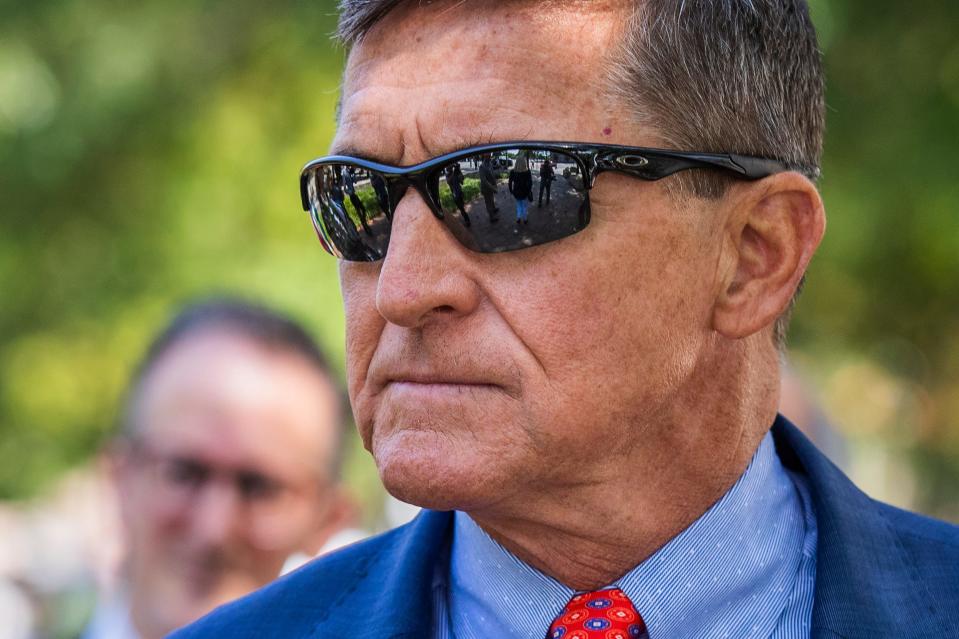Michael Flynn judge defends decision to challenge DOJ request to drop case; no 'rubber stamp'
The federal judge overseeing the fraught prosecution of former national security adviser Michael Flynn Monday defended his decision to review the Justice Department's effort to abandon the case, calling such a move "unprecedented."
"It is unusual for a criminal defendant to claim innocence and move to withdraw his guilty plea after repeatedly swearing under oath that he committed the crime," attorneys for U.S. District Judge Emmet Sullivan said in documents filed in a D.C. appellate court. "It is unprecedented for an acting U.S. Attorney to contradict the solemn representations that career prosecutors made time and again, and undermine the district court’s legal and factual findings, in moving on his own to dismiss the charge years after two different federal judges accepted the defendant’s plea."
Flynn's lawyers asked the appeals court last month to force the dismissal of his case and to assign him to a different judge, asserting that Sullivan had abused his discretion.

They took special issue with Sullivan's appointment of a retired judge to challenge the Justice Department's move to abandon the prosecution and to examine whether the former Army general committed perjury for declaring his innocence of a crime he had earlier admitted.
But Sullivan pushed back hard in court documents Monday, raising serious questions about the legitimacy of the government effort to abandon Flynn's case.
"That the government filed a 'lengthy motion and exhibits' supporting dismissal does not conclusively establish that it 'acted properly," Sullivan attorney Beth Wilkinson argued.
Sullivan's attorneys noted that the government's motion to dismiss Flynn's case was signed only by the acting U.S. attorney – not by any of the prosecutors who worked on the case – and did not include documents supporting its new factual allegations.
Abandoning a prosecution: DOJ drops case against former Trump adviser Michael Flynn in boldest step yet to undermine Mueller probe
Another Flynn inquiry: FBI launches internal review of Michael Flynn investigation; inquiry to focus on possible misconduct
Wilkinson also defended Sullivan's appointment of retired federal judge John Gleeson to challenge the government's position, claiming that "someone needs to fill the adversarial gap" in a case where both the government and Flynn have joined forces.
"In any event, Judge Sullivan’s record shows that he will not blindly accept Judge Gleeson’s recommendations," Wilkinson said.
Contrary to Flynn's assertions, federal district judges have the authority to appoint an amicus – a practice the Supreme Court has not called into question, particularly in cases where "the adversarial process breaks down because the parties are aligned," Wilkinson argued.
The rules governing federal criminal cases don't require Sullivan to "serve as a mere rubber stamp," Wilkinson said.
In a separate filing, the Justice Department said that it was up to federal prosecutors –not a judge – to decide whether to pursue a criminal case.
"Instead of inviting further proceedings, the court should have granted the government’s motion to dismiss," the government argued. "If the United States and the defendant agree that the indictment should be dismissed, there remains no dispute between the parties, there is no need for a court to impose judgment against the defendant, and there is thus no basis for the further exercise of judicial power."
The legal clash at the appeals court represents the latest escalation in what has become a contentious, long-running prosecution of President Donald Trump's former national security adviser. Flynn, one of a half-dozen Trump campaign aides and allies who were prosecuted as a result of the special counsel Russia investigation, pleaded guilty in 2017 to lying to the FBI about his communications with a former Russian ambassador.
He later reversed course, accusing Justice Department officials of trapping him into making false statements and not disclosing evidence that would've exonerated him.
The Justice Department under Attorney General William Barr, who has tapped an outside prosecutor to review Flynn's case, later announced its intention to abandon the prosecution. The department said the January 2017 interview during which Flynn made false statements to the FBI was "unjustified." The interview did not have "a legitimate investigative basis," making Flynn's statements irrelevant "even if untrue," the department argued.
Instead of granting the dismissal, Sullivan appointed retired federal judge John Gleeson to argue against dropping the case and to assess whether Flynn should be held in contempt for perjury.
Flynn's attorneys said Sullivan did not have the authority to appoint a third party. They also said the judge can't deny the motion to dismiss the case, saying the Justice Department has "sole authority" to drop its prosecution.
"The district judge’s orders reveal his plan to continue the case indefinitely, rubbing salt in General Flynn’s open wound from the Government’s misconduct and threatening him with criminal contempt," the attorneys wrote.
This article originally appeared on USA TODAY: Michael Flynn judge defends decision to challenge DOJ effort to drop case

